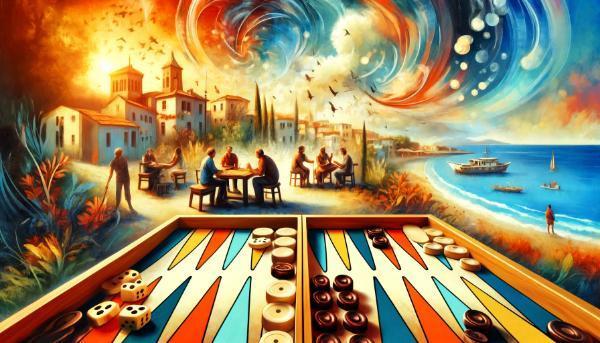Since you are reading this story, I assume you are more likely than not to have never played — or even heard of — the game of backgammon. I am not here intending to go into any encyclopedic details about its history or its mathematical analysis. I rather wish to communicate an observation I recently made that struck my mind with the exhilaration of discovery: that this game encapsulates what I believe is the most profound essence of life.
Before we talk about backgammon itself, let us imagine all possible games on a scale according to the degree that luck influences their outcomes…
At the one extreme of such a scale, you have games like dice. Their results are completely random. You can sit down and play against an opponent for a million years. In the end, the percentage of rounds you’d have won would range in several decimals beyond the 50th or the 49th cardinal.
At the other extreme dwell games like chess, where luck is absent. If one player is significantly more advanced than another, the percentage of games he’d have lost till the end of time — assuming brains equally disposed to improvement — would be infinitesimally above zero. And that applies solely to human players where a tiny bit of randomness may be introduced in the form of environmental and mental distractions. The game itself is governed purely by computational capacity.
Between these two extremes, you find a vast collection of games whose outcomes determine different combinations of luck and ability. Backgammon is one of them. But more about it in a bit…
In mercy of chance
I was personally never drawn to the first kind of games we spoke about. I consider them a big waste of time — let alone other resources.
Such games actually happen to be played exclusively by people who do squander on them additional resources; namely money. No reasonable person would play dice or roulette for hours — or seconds for that matter — for the sake of entertainment alone.
People are attracted to chance games — at least superficially — solely by the hope of obtaining a profit. Profoundly, gamblers (meaning actual, problem gamblers, and not money-launderers) are desperate people who have given up all faith in their capacity to affect reality and instead surrender to chance; much like precants, the only difference being that they skip the supernatural’s personification or materialization—in the form of some subject like a saint or some object like two crossed-over sticks—in favor of worshipping luck directly.
Gambling paradoxically represents the player’s highest hopes and deepest hopelessness at the same time.
In quest of control
My personal attitude has been different towards the other extreme of games. Particularly chess has been one of my long-time obsessions. There is no doubt that this and similar games help one cultivate countless, invaluable, life-applicable skills and mental dispositions. But if practiced in excess, they have the potential to cause no fewer problems than gambling.
I couldn’t possibly count the times I have deleted and reinstalled the chess app on my phone. The former part of the cycle typically occurs at those points in time I end up mindlessly playing blitz chess through entire nights followed by mornings of sitting on an unflushed toilet for hours while going through a long sequence of last matches. The latter part occurs upon instances I grow overwhelmed by meaningful activities and look for a temporary escape.
After all, the association of chess with madness is so well documented that it has even infiltrated popular culture. This game has a devilish potency to suck one’s mind away from reality.
This isn’t surprising. This is the exact kind of game that least of all resembles reality. Because reality is primarily haphazard in nature. Chess players are generally people with control-freakish tendencies. But life is not renowned for its controllability.
In sync with reality
Life is a succession of instances whereupon the one experiencing it has to react to cruel, arbitrary circumstances. Reality is impartial; it doesn’t give a damn about one’s aims and desires; it coldly happens.
Games people play reflect their attitudes towards the — indeed distressing — inescapable superposition of chance over their lives. Some battle this ultimate fact by surrendering to faith in supernatural luck; others by embarking onto futile, quixotic ventures to take full control of possibilities.
Probably the majority of people strike a balance on some combination of reacting to and compromising with life. And so they tend to play games that mix chance with aptitude. Most board games, card games, puzzle games, and so on are examples of such.
They come in the whole range of combinations between their two constituents. But one of such games I like to play and my gut says it closely approximates life’s golden ratio of action versus acceptance is backgammon.
Briefly explained, that is played with a board divided into 24 positions, 15 checkers for each player, and two dice. Abiding by a few different, common sets of rules, the players have to move their pieces around the board. Each move is defined primarily by a roll of the dice, but the player maintains a significant complexity of options with regard to how to handle every eventuality, influencing the game’s outcome down to very subtle statistical variances. Whereas the result of any one match is largely undecided, the ablest player is certain to come out better-off in the long run.
And that’s how life is played, too. We cross ways with a constant stream of unpredictability, to which we ideally react with optimal competence to finely influence the odds in our favor. And to accept the rule of chance is the most crucial inclination we have to adopt before we even begin to optimize our countering tactics against this indomitable force.
That’s what backgammon teaches us. Sure, it too is but a waste of time if played excessively. But at least, even when that’s the case, it seemingly is a healthier, happy excess. Picture a group of merrily-chatting old men around a backgammon board by some blue Mediterranean coast…
I think that’s a sort of image that vividly portrays the genius of the serenity prayer:
God grant me the serenity to accept the things I cannot change,
Courage to change the things I can,
and Wisdom to know the difference.

